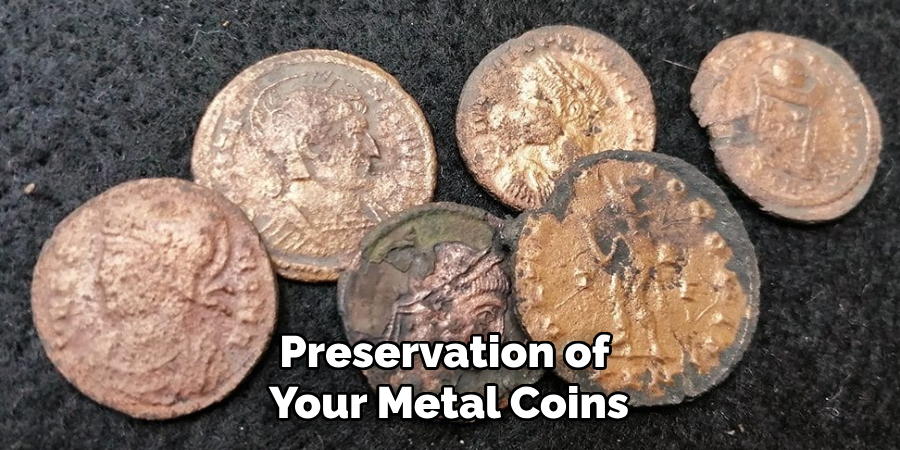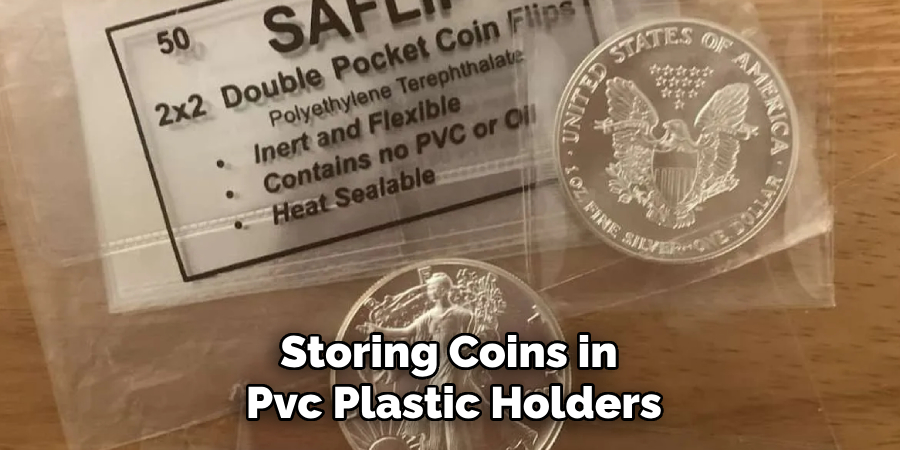Metal coins hold significant value, whether as collectible items, historical artifacts, or objects of sentimental worth. “How to keep metal coins safe” is crucial for novice and seasoned collectors. The preservation of these valuable pieces is essential not only to maintain their financial worth but also to protect their historical significance and personal meaning. However, keeping coins in pristine condition poses challenges, as they are vulnerable to damage from exposure to elements such as air and moisture and improper handling.

This comprehensive guide addresses these issues by providing detailed instructions on best practices for storing, cleaning, and handling metal coins. By adopting these measures, you can ensure your collection remains in top-notch condition, safeguarding your investment and securing your coins’ longevity and historical integrity for future generations.
Understanding the Risks of Metal Coins
Common Causes of Damage
Cratches, tarnishing, corrosion, and oxidation frequently affect heavy metal coins. These issues often arise from exposure to air, humidity, or contact with oils from human skin. Handling coins without gloves can transfer these oils, accelerating deterioration. Tarnishing, a chemical reaction that dulls a coin’s surface, is particularly common in metals like silver. Environmental factors, such as air pollution and fluctuating temperatures, can also contribute to these forms of damage, emphasizing the need for careful handling and storage.
The Impact of Improper Storage
Improper storage conditions can severely affect a coin’s condition, causing discoloration, pitting, or surface degradation that diminishes its value and visual appeal. Storing coins in materials like PVC plastic can lead to chemical reactions, further harming their surface. Consistent exposure to moisture and air accelerates deterioration, making it critical to use archival-quality materials and maintain controlled environmental conditions. Proper storage is essential to preserve a coin collection’s aesthetic and monetary value.
Handling Coins Properly
Using Gloves
Always wear cotton gloves or nitrile gloves when handling metal coins to prevent oils, dirt, or moisture from transferring from your hands. These substances can cause long-term damage, accelerating the deterioration process. By forming a barrier between your skin and the coins, gloves help maintain the coins’ original luster. Additionally, avoid touching the faces of the coin; handle them by the edges only to minimize the risk of scratches. This careful handling technique preserves your collection’s aesthetic and intrinsic value, ensuring the coins remain in excellent condition over time.
Proper Techniques for Picking Up Coins
When picking up coins, minimizing direct contact with the metal surface is crucial. Use a soft cloth, a pair of tongs, or a dedicated coin holder for safe handling. These tools help avoid unnecessary contact that could lead to blemishing or smudging. Ensure the cloth or tools are clean and free from abrasive materials that could scratch the coin. Never bend or twist the coins when handling them, as this can cause dents or warping. You can safeguard your collection against potential physical damage by employing these careful techniques.
How to Keep Metal Coins Safe: Storing Metal Coins Safely
Using Coin Holders and Capsules
Using appropriate storage holders is essential to ensure the longevity and preservation of your metal coins. Individual holders such as 2×2, coin capsules, or flip cases crafted from non-PVC materials are highly recommended. These storage solutions are designed to offer maximum protection, minimizing the risk of damage from environmental factors. Air-tight capsules, in particular, provide an additional layer of protection by safeguarding coins from humidity and air exposure, which can lead to tarnishing or corrosion over time.
When selecting holders or capsules, prioritize materials that are inert and archival quality to maintain the integrity of your coins.

Coin Albums and Folders
Coin albums or folders made with acid-free pages provide an organized and practical option for storing multiple coins simultaneously. These albums allow for easy viewing and categorization of your collection while also protecting coins from physical damage, such as scratches or abrasions. To ensure optimal protection, choose albums that boast archival-grade pages, free from PVC and other harmful chemicals that could degrade the coin’s surface. By using high-quality albums, you can enjoy the visual appeal of your collection without compromising its condition.
Safe Deposit Boxes or Climate-Controlled Storage
Enhancing security through safer storage options is vital for collectors with rare or high-value coins. Consider utilizing a safe deposit box at a reputable bank, providing security and optimal environmental conditions away from potential home hazards. Alternatively, a climate-controlled safe within your residence can serve as another excellent option. Ideal storage conditions for coin preservation include maintaining temperatures between 60–70°F (15–21°C) and consistent humidity levels around 50%.
These conditions help prevent tarnishing or deterioration of the coin’s surface. Moreover, avoiding placing coins in direct sunlight or near heat sources is crucial, as such exposure could accelerate the degradation process. Ensuring the proper storage environment will protect your collection’s value and prolong its aesthetic and historical significance.
Cleaning and Maintaining Metal Coins
Why You Should Avoid Cleaning Coins
Cleaning coins is a practice that should be avoided in most circumstances due to the potential loss of natural patina or finish, which significantly contributes to a coin’s collector value. This patina forms over time and is often seen as evidence of the coin’s history and authenticity. Cleaning can strip away these characteristics, reducing not only the aesthetic appeal but also the coin’s monetary value. Thus, coins should only undergo cleaning if absolutely necessary and always be approached with extreme caution to prevent unintended damage.

How to Clean Coins
If cleaning becomes unavoidable, it is essential to approach the process with care and gentleness. Use distilled water to rinse the coins and a soft brush to gently scrub away surface dirt or debris. It’s crucial to avoid employing harsh chemicals, abrasives, or cleaning agents, as these can cause irreparable damage. Cleaning should only be performed when a coin appears visibly dirty, and special care should be taken not to scrub too hard. This cautious approach will help preserve the coin’s integrity, maintaining both its appearance and value within your collection.
Preventing Tarnish and Corrosion
Using Anti-Tarnish Strips
Placing anti-tarnish strips or packets in your coin storage boxes is an essential protective measure against tarnish buildup. These strips absorb moisture and atmospheric pollutants, common contributors to tarnish. When selecting the strips, ensure they are specifically designed for coins to prevent any adverse chemical reactions that might affect the metal’s surface. Regularly replacing the strips as the manufacturer recommends will help maintain their effectiveness, thus providing ongoing protection for your collection.
Humidity Control
Controlling humidity levels in your coin storage area prevents corrosion, especially for more reactive metals like copper or silver coins. Utilizing silica gel packets is an effective way to absorb excess moisture that may accumulate in storage spaces. Also, a dehumidifier can help maintain a balanced humidity level, ideally around 50%. Regular monitoring and adjustments to the humidity can prevent the onset of corrosion, safeguard your collection from long-term damage, and ensure your coins remain in optimal condition.

Keeping Your Coins Safe from Theft
Secure Storage Locations
Always store coins in locked, secure storage units like safes or secure deposit boxes to safeguard your valuable coin collection from theft. Avoid placing coins in easily accessible locations or areas where they are visible, such as near windows or in open spaces. Opt for a safe with a high-security rating, ideally bolted to a secure part of your home, to further reduce the risk of unauthorized access or removal.
Documenting Your Collection
Maintaining a detailed inventory of your coin collection is crucial for protecting against theft. Record comprehensive descriptions and take photographs of each coin, focusing on unique features to aid in identification. If applicable, keep a log of serial numbers for rare or high-value coins. Store this documentation in multiple digital and physical formats in secure locations, ensuring quick access to necessary information if recovery efforts become necessary.
Common Mistakes to Avoid
Storing Coins in Poor Materials
Avoid storing coins in PVC plastic holders, as they can cause discoloration and deterioration over time. PVC releases chemicals that can settle on the coin’s surface, leading to a greenish residue that is difficult to remove. Additionally, refrain from using paper envelopes containing sulfur, as sulfur can react with metal surfaces, resulting in tarnish or corrosion. To ensure your collection’s longevity, always choose archival-safe storage materials that are archival-safe and free of harmful chemicals.
Cleaning Coins Too Often
Excessive cleaning can damage a coin’s surface, stripping away its natural patina and reducing its collector value. It is best to handle coins only when necessary and to always clean them gently, using minimal pressure and avoiding harsh cleaning agents. Consider limiting the frequency of cleaning, as each cleaning session carries a risk of abrasion or unintended damage. By prioritizing preservation over unnecessary restoration, collectors can maintain their coins’ aesthetic and historical integrity.

Conclusion
Proper handling, storage, and cleaning are essential to preserving the value and appearance of metal coins. By understanding “how to keep metal coins safe,” collectors can ensure long-term protection of their prized collections. It is crucial to use high-quality storage materials free of harmful chemicals and maintain a controlled environment with stable temperature and humidity levels. Regular care and cautious cleaning help retain the coins’ natural patina and historical integrity. Through these practices, your metal coin collection will remain in excellent condition, safeguarding both its aesthetic beauty and monetary worth for generations.
Edmund Sumlin is a skilled author for Metal Fixes, bringing 6 years of expertise in crafting a wide range of metal fixtures. With a strong background in metalwork, Edmund’s knowledge spans various types of fixtures, from decorative pieces to functional hardware, blending precision with creativity. His passion for metalworking and design has made him a trusted resource in the industry.
Professional Focus:
- Expert in Metal Fixtures : Edmund aesthetic specializes in creating durable and innovative metal fixtures, offering both appeal and functionality. His work reflects a deep understanding of metalworking techniques and materials.
- Sustainability Advocate : He is dedicated to using sustainable practices, ensuring that every fixture is crafted with eco-friendly methods while maintaining high-quality standards.
In his writing for Metal Fixes, Edmund provides valuable insights into the latest trends, techniques, and practical advice for those passionate about metal fixtures, whether they are professionals or DIY enthusiasts. His focus on combining artistry with engineering helps others discover the true potential of metal in design.


